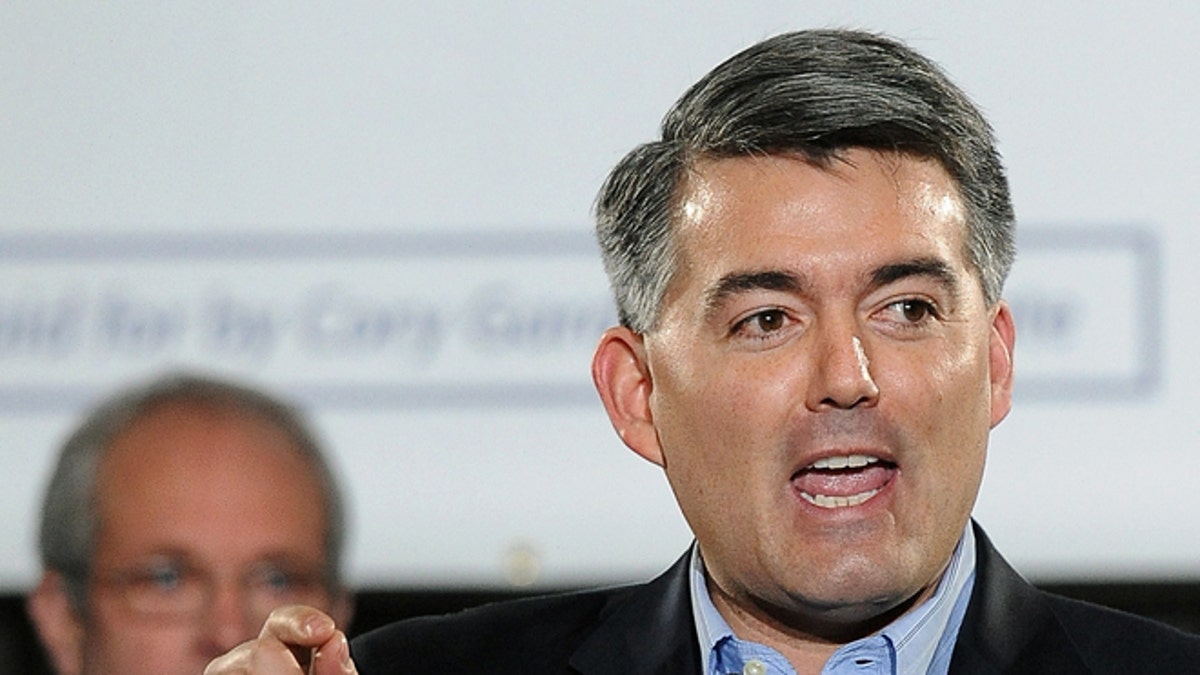
FILE: March 1, 2014: Rep. Cory Gardner, R-Colo., announces his Senate candidacy at Denver Lumber Company, in Denver, Colo. (AP)
The Senate race in Colorado emerging as one of the most competitive in 2014 has surprised the Democratic incumbent who is now trying to define top Republican challenger Rep. Cory Gardner as an extremist.
"People will find my record is a mainstream record, and the more people look at Rep. Gardner's record they'll see he's out of the mainstream," Democratic Sen. Mark Udall recently told a Colorado radio station.
Gardner, meanwhile, is tracking to the center after four years representing a conservative, rural district in Congress. As Gardner scrambles to raise money and assemble a campaign staff, his allies have hammered Udall's support for President Obama's health care law.
"Tell Sen. Udall to stop thinking about politics and start thinking about people," an announcer says in a $1 million ad paid for by Americans for Prosperity.
The political dynamics reflect those of House and Senate campaigns across the nation this year, when all 435 House seats and 36 seats in the Senate are on ballots. Republicans need a six-seat gain to take control of the Senate while the House is expected to remain in their hands.
Washington Republicans say they are now competitive in more than a dozen states this year in their quest to take control of the Senate.
In Colorado, the extremist label is potent. Democrats have won every top-of-the-ticket race in the state since 2004 partly by attacking Republicans as out of the mainstream, especially on issues central to moderate suburban women who carry outsized influence in elections. The state is evenly split between registered Democrats, Republicans and independent voters.
Still, Udall, 63, has far from a clear ride to re-election. ObamaCare is deeply unpopular in his state, with 60 percent of registered voters opposing it, according to a Quinnipiac University poll last month.
Republicans have also begun to criticize Udall for supporting an Obama administration nominee for an Interior Department post who they contend is hostile to the energy industry.
Generally, polls have shown Udall barely ahead of Republican challengers, almost all of whom have dropped out of the primary since Gardner announced his bid.
Seth Masket, a political scientist at the University of Denver, said Gardner's shift away from giving legal rights to fertilized human eggs, or personhood, was a smart move.
"This is what happens when you have an officeholder from a very conservative district running statewide,” he said.
Sean Tonner, a Republican consultant in Denver, said it makes sense for Democrats to hit Gardner hard and fast, because more voters have made up their minds on the better-known Udall.
He said both politicians will be hard to demonize. Gardner, 39, is likable and upbeat, Tonner said, unlike the angry Republican in the typical Democratic attack ad.
"Mark Udall looks like he's out of central casting for Western politician -- he looks like he was born with a Patagonia jacket sitting on a 14er," Tonner said, referring to Colorado's fabled peaks over 14,000 feet.
Democrats acknowledge Gardner's sunny demeanor but argue that the voting record he compiled in his conservative district, anchored in the farm towns that dot the northeast corner of the state, will hamper him.
In the state Legislature, Gardner co-sponsored a bill to make it a felony for a doctor to perform an abortion except to save the life of the mother, with no exceptions for rape or incest.
Democrats see more fodder in Gardner's record since being elected to the House in the Republican wave of 2010. He supported former Republican Vice Presidential Candidate Paul Ryan's budget, which would transform Medicare into a voucher-like system; reversing an Obama administration decision granting relief from deportation to some people brought to the United States illegally as children; and the budget proposal that sparked last year's partial government shutdown.
Gardner had supported a "personhood" ballot measure in Colorado. That effort was overwhelmingly rejected twice at the polls, but supporting it was key to winning Republican primaries in Colorado. In Congress, he twice co-sponsored federal versions of the effort. But earlier this month, after Gardner's last significant opponent in the GOP Senate primary dropped out, he said he realized critics' arguments that the ballot measure could outlaw some forms of birth control were correct, and he withdrew his support.
Democrats have savaged Gardner for the reversal, arguing that he's an opportunist.
"He may be a likable politician, but I don't think that's enough," said Craig Hughes, a Democratic consultant. "Cory Gardner is a political beast, and people don't like that."
The Associated Press contributed to this story.




